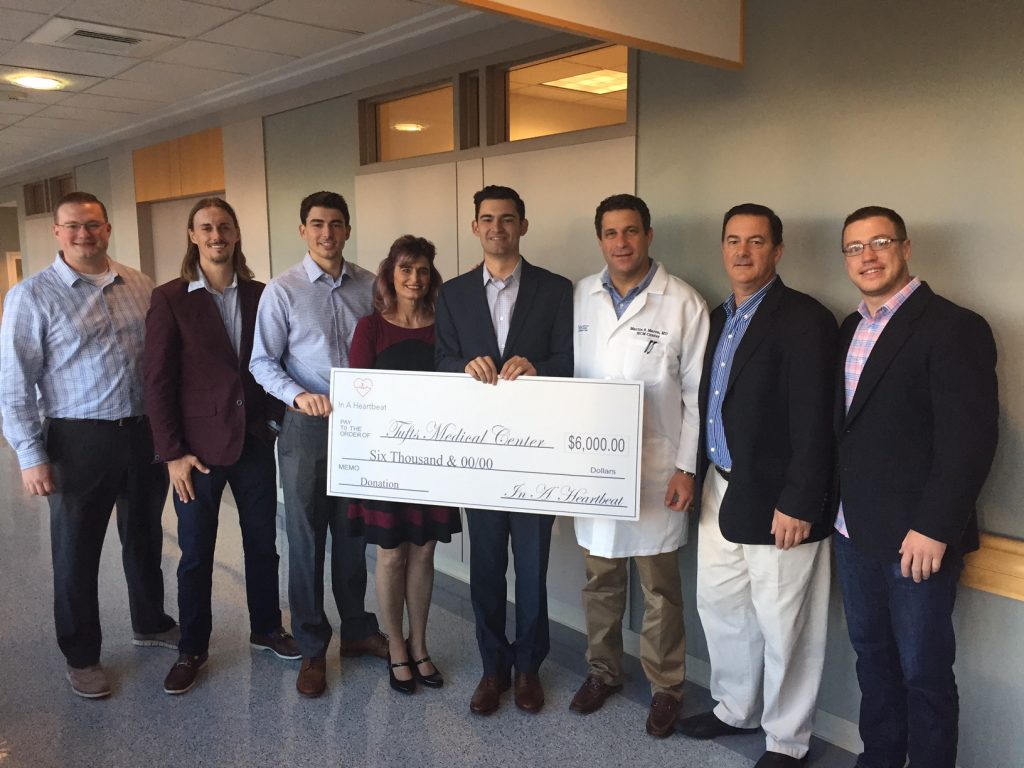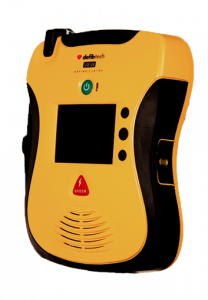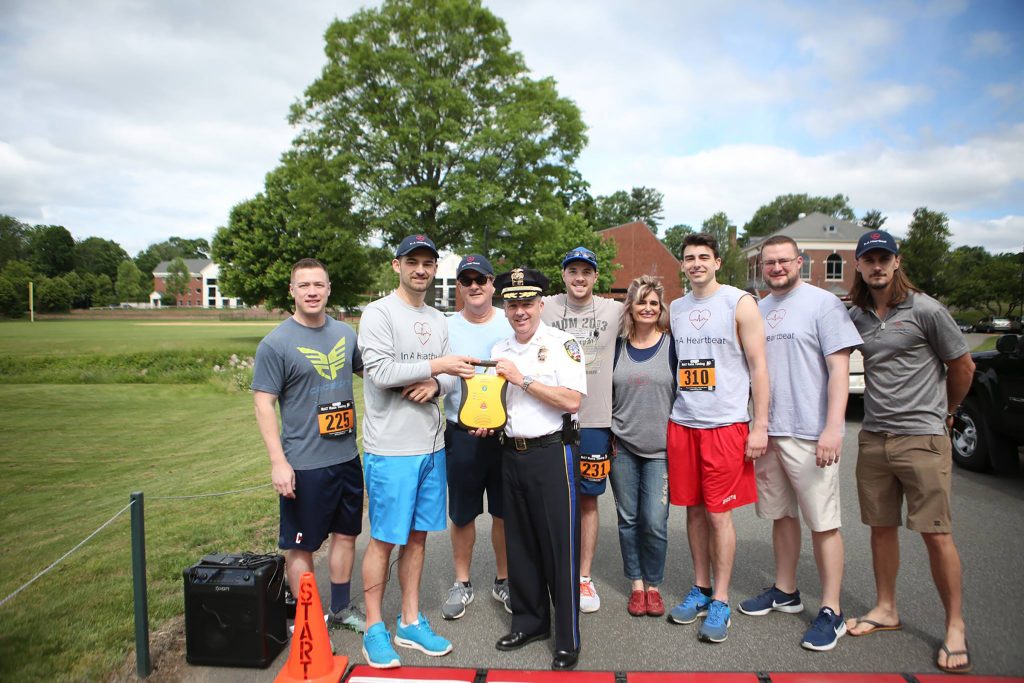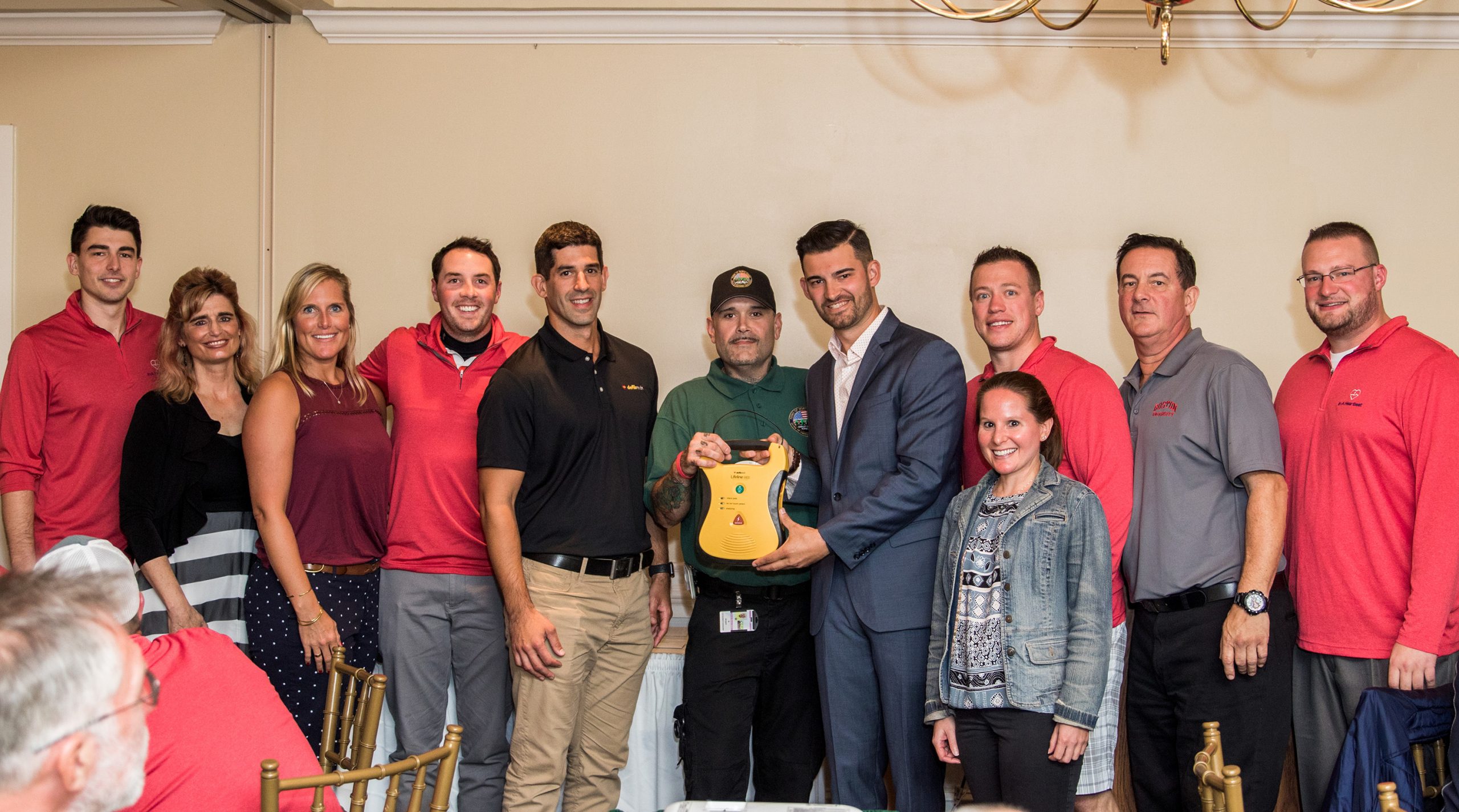The expression “It can all change in a heartbeat” may sound like a cliché, but for those who have survived a life-threatening episode, like Mike Papale, nothing could ring truer.
The morning of Aug. 24, 2006, started out no different from any other day in the life of the 17-year-old high school basketball player, who planned to continue playing his beloved sport in college that fall. But soon after arriving at Wallingford Parks & Recreation summer camp, where Papale coached basketball, he suddenly slumped over on the bench where he was seated and onto the floor, where he lay unresponsive while someone called 911.
There was no automated external defibrillator (AED) on-site but, fortunately for Papale, an EMT working nearby got to him in time, performing CPR for eight minutes and saving the teenager’s life.
It turned out Papale had suffered sudden cardiac arrest, and after arriving by ambulance at MidState Medical Center, he suffered a second arrest and was revived. He was then transported by LIFE STAR to Hartford Hospital, his parents not knowing if their son would survive and, if so, whether he would have brain damage.
The good news was that Papale survived with no brain injury. The bad news was that the doctors determined he had hypertrophic cardiomyopathy, creating a thickness of the septum and apex of his heart. This required the insertion of an implantable cardioverter-defibrillator (ICD) in his chest, which meant he would never again be able to play competitive basketball.
Papale, now 30, doesn’t pretend that this wasn’t a devastating experience for a teenager.
“Basketball was my whole life at that point, and it got taken away from me,” he says. “I felt anger, frustration, and depression and it took some time to get over that. But it was also a balancing act for me between thinking, ‘OK, I can’t play basketball anymore, but I’m also lucky to be alive.’ When a doctor tells you there was a one in a million chance you’d survive, it really puts things into perspective.”
Doctors determined Papale had heart disease that went undetected until the cardiac arrest.
“That’s how it happens a lot,” he says. “Kids are born with these undiagnosed conditions. You don’t get an EKG until you’re older and so they may not have signs or symptoms until one day, they just drop.”
Papale’s mother Joan says it was the most terrifying day of her life, as well as the most blessed because she had no doubt that “God stepped in and put every player exactly where they needed to be, at the exact moment – and that’s what ultimately saved Mike.”
Papale says shortly after returning to their home in Wallingford, his mother set up a meeting at a local branch of the American Heart Association (AHA) and signed them both up as volunteers.
“I didn’t really want to do it. I was 17,” Papale says. “But she got me going because she told me that by sharing my story and raising awareness about what happened to me, and talking about CPR and the importance of AEDs in cardiac arrest, it could prevent someone else from going through the trauma we experienced as a family.”
An AED is a portable, easy-to-use device that can analyze the heart’s rhythm and deliver an electrical shock, if needed, to help bring back an effective rhythm.
Mother and son participated in many AHA events and walks, and lobbied in Hartford and Washington, D.C. They helped get two Connecticut bills passed that mandate AEDs be placed in all of the state’s public schools.
“We watched the governor sign the bill into law in 2009,” Papale recalls. “It was a really cool and rewarding experience.”
A Firm Foundation
As the years passed, life began to feel normal again for Papale. He graduated from Quinnipiac University in Hamden and pursued his new dream of being a college basketball coach. After a year as an assistant coach at the University of Massachusetts, he was hired as director of basketball operations at Quinnipiac.
But in August 2014, eight years after his cardiac arrest, Papale suffered a major setback. A series of problems occurred following what began as routine surgery to change his defibrillator battery. His defibrillator became infected, requiring risky emergency open-heart surgery and eight blood transfusions. A new defibrillator was installed five months later and luckily, the surgery went perfectly.
After his recovery period was over, Papale knew how lucky he was to survive two major life-threatening situations and that’s when the idea for In A Heartbeat Foundation was born – a nonprofit with one goal: to save lives.
In A Heartbeat focuses on four things that Papale, its president, thinks are most critical: donating AEDs where needed, providing training to use AEDs, raising money for heart disease research, and supporting patients and screening kids.
According to Papale, In a Heartbeat Foundation has donated close to 100 AEDs to date (at a cost of about $1,000 each), and given $25,000 for heart research. There are plans to donate another $12,000 by year’s end to another research project.
How has the nonprofit raised so much money and awareness in such a short time? Papale gives a lot of credit to his dedicated board of directors, including his mother, father, brother, several friends, other survivors, patients and others.
Joan Papale is astonished by the foundation’s quick growth.

“We live in a community that has embraced Mike’s quest to save lives and spread awareness,” she says. “However, Mike as president is the driving force.”
Mike Papale, she notes, does public speaking, trains people in CPR and AED use, has started a support group, connects with doctors and electrophysiologists all over the country, plans and runs fundraising events, and attends symposiums to educate himself with the newest information.
Like many who run nonprofits, Papale acknowledges fundraising is the biggest challenge.
“I don’t have a business background, but it’s what I love to do,” he says, “so I’m self-learning and reading, and learning what works and what doesn’t.”
Another challenge, Papale notes, is that although AEDs are becoming more prevalent, the survival rates of cardiac arrest aren’t going up because people are unsure how to use AEDs or are afraid of them.
“We’re trying to raise more awareness that these machines are simple to use. You cannot hurt someone with them; they’re actually made for the layperson,” he says. “So even if you don’t have training, you can use it as long as you listen to the instructions.”
Carlos Collazo, executive director of the Ulbrich Boys & Girls Club in Wallingford, which received a donation of an AED from In A Heartbeat, says it couldn’t have come at a better time.
“Part of creating a culture of safety is ensuring we have the necessary resources in place to provide a safer environment,” Collazo says. “When cardiac arrest strikes, an AED can mean the difference between life and death.”

Making A Difference
Today, Papale runs In A Heartbeat full time and continues to coach basketball part time. He feels it’s a good balance of doing the things about which he is most passionate.
He has lived with an ICD for 13 years now and says, “Heart disease is scary for a lot of people and it was for me for a long time. And it’s still always in the back of my mind, but I’ve learned to live my life very normally. I go to the gym every day. I’m active. I run. I just do things in moderation.”
He adds, “I’m always telling cardiologists when I speak at conferences to have their patients call me. It would have been cool for me when I was 17 if I had a 25- or 30-year-old guy who had already gone through what I’ve been through to talk to, to be a mentor.”
Papale’s father, Mike Papale, Jr. of Cheshire, is in awe of how his son has handled this major change in his life.
“His strength and courage really helped me to deal with the situation,” he says. “As time went on, it was truly amazing how Mike took this experience and became a difference-maker in the world of heart research and saving lives through the donations of AEDs. He’s so passionate about the work he does. His enthusiasm is always at a high level.”

Adds Joan Papale: “Mike’s journey began with his determination to protect other families from what we went through. This would eventually segue into a crusade to save lives. Standing alongside my son through all his battles and joyous moments has been an honor.”
“I think a lot of people spend their whole lives trying to figure out their purpose,” reflects Mike Papale, “and mine kind of got handed to me.”
To learn more about In A Heartbeat Foundation, visit www.inaheartbeat.org.







More Stories
Autism Families CONNECTicut Steps Up for the Local Community Building a Nonprofit From the Ground Up
Hospital for Special Care’s Ivan Lendl Adaptive Sports Camp
Special Olympics Connecticut: Supporting and Inspiring a Special Community